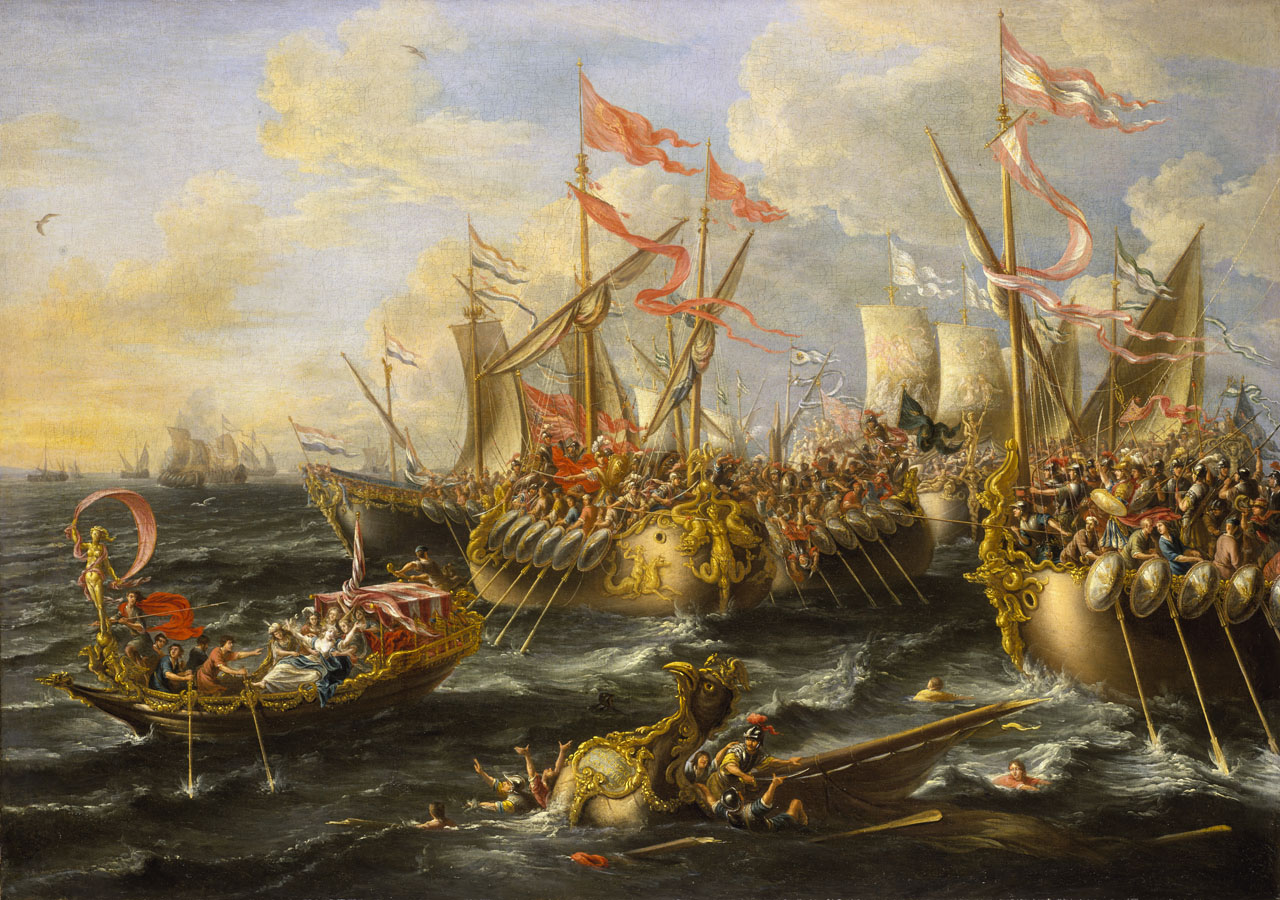
The
Battle of Actium 2 September 31BC
Caesar Augustus (23 September 63 BC – 19 August AD 14), also known as Octavian, was the first Roman emperor, reigning from 27 BC until his death in AD 14. His status as the founder of the Roman Principate (the first phase of the Roman Empire) has consolidated a legacy as one of the greatest leaders in human history. The reign of Augustus initiated an era of relative peace known as the Pax Romana. The Roman world was largely free from large-scale conflict for more than two centuries, despite continuous wars of imperial expansion on the Empire's frontiers and the year-long civil war known as the "Year of the Four Emperors" over the imperial succession.
Originally named Gaius Octavius, he was born into an old and wealthy equestrian branch of the plebeian gens Octavia. His maternal great-uncle
Julius Caesar was assassinated in 44 BC and Octavius was named in Caesar's will as his adopted son and heir; as a result, he inherited Caesar's name, estate, and the loyalty of his legions. He,
Mark Antony and Marcus Lepidus formed the Second Triumvirate to defeat the assassins of Caesar. Following their victory at the Battle of Philippi (42 BC), the Triumvirate divided the Roman Republic among themselves and ruled as de facto dictators. The Triumvirate was eventually torn apart by the competing ambitions of its members; Lepidus was exiled in 36 BC and Antony was defeated by Octavian at the Battle of Actium in 31 BC.
After the demise of the Second Triumvirate, Augustus restored the outward façade of the free Republic, with governmental power vested in the Roman Senate, the executive magistrates and the legislative assemblies, yet maintained autocratic authority by having the Senate grant him lifetime tenure as commander-in-chief, tribune and censor. A similar ambiguity is seen in his chosen names, the implied rejection of monarchical titles whereby he called himself Princeps Civitatis (First Citizen) juxtaposed with his adoption of the ancient title Augustus.
Augustus dramatically enlarged the Empire, annexing Egypt, Dalmatia, Pannonia, Noricum and Raetia, expanding possessions in Africa, and completing the conquest of Hispania, but suffered a major setback in Germania. Beyond the frontiers, he secured the Empire with a buffer region of client states and made peace with the Parthian Empire through diplomacy. He reformed the Roman system of taxation, developed networks of roads with an official courier system, established a standing army, established the Praetorian Guard, official police and fire-fighting services for Rome, and rebuilt much of the city during his reign. Augustus died in AD 14 at the age of 75, probably from natural causes. Persistent rumors, substantiated somewhat by deaths in the imperial family, have claimed his wife Livia poisoned him. He was succeeded as emperor by his adopted son Tiberius, Livia's son and also former husband of Augustus' only biological daughter Julia.
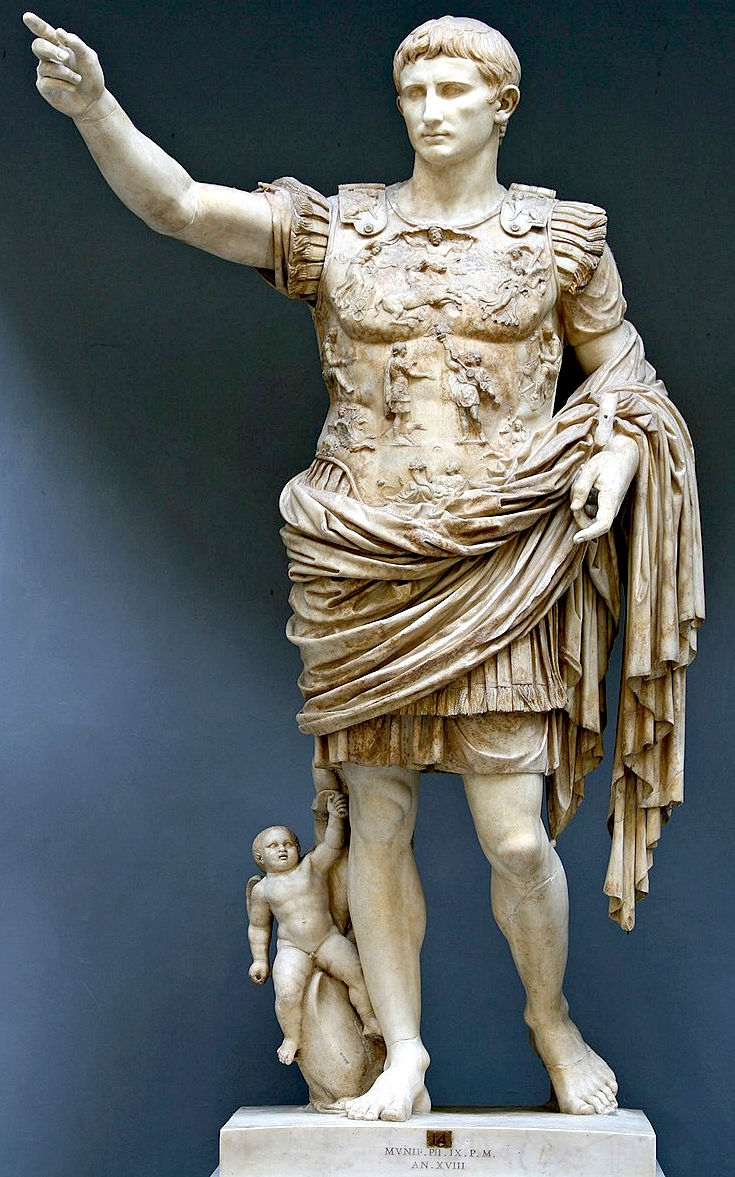
RISE TO POWER
Octavius was studying and undergoing military training in Apollonia, Illyria, when Julius Caesar was assassinated on the Ides of March (15 March) 44 BC. He rejected the advice of some army officers to take refuge with the troops in Macedonia and sailed to Italy to ascertain whether he had any potential political fortunes or security. Caesar had no living legitimate children under Roman law, and so had adopted Octavius, his grand-nephew, making him his primary heir. Mark Antony later charged that Octavian had earned his adoption by Caesar through sexual favours, though Suetonius describes Antony's accusation as political slander. This form of slander was popular during this time in the Roman Republic to demean and discredit political opponents by accusing them of having an inappropriate sexual affair. After landing at Lupiae near Brundisium, Octavius learned the contents of Caesar's will, and only then did he decide to become Caesar's political heir as well as heir to two-thirds of his estate.
Upon his adoption, Octavius assumed his great-uncle's name Gaius Julius
Caesar. Roman citizens adopted into a new family usually retained their old nomen in cognomen form (e.g., Octavianus for one who had been an Octavius, Aemilianus for one who had been an Aemilius, etc.). However, though some of his contemporaries did, there is no evidence that Octavius ever himself officially used the name Octavianus, as it would have made his modest origins too obvious. Historians usually refer to the new Caesar as Octavian during the time between his adoption and his assumption of the name Augustus in 27 BC in order to avoid confusing the dead dictator with his heir.
Octavian could not rely on his limited funds to make a successful entry into the upper echelons of the Roman political hierarchy. After a warm welcome by Caesar's soldiers at Brundisium, Octavian demanded a portion of the funds that were allotted by Caesar for the intended war against the Parthian Empire in the Middle East. This amounted to 700 million sesterces stored at Brundisium, the staging ground in Italy for military operations in the east.
A later senatorial investigation into the disappearance of the public funds took no action against Octavian, since he subsequently used that money to raise troops against the Senate's arch enemy Mark Antony. Octavian made another bold move in 44 BC when, without official permission, he appropriated the annual tribute that had been sent from
Rome's Near Eastern province to Italy.
Octavian began to bolster his personal forces with Caesar's veteran legionaries and with troops designated for the Parthian war, gathering support by emphasizing his status as heir to Caesar. On his march to Rome through Italy, Octavian's presence and newly acquired funds attracted many, winning over Caesar's former veterans stationed in Campania. By June, he had gathered an army of 3,000 loyal veterans, paying each a salary of 500
denarii.
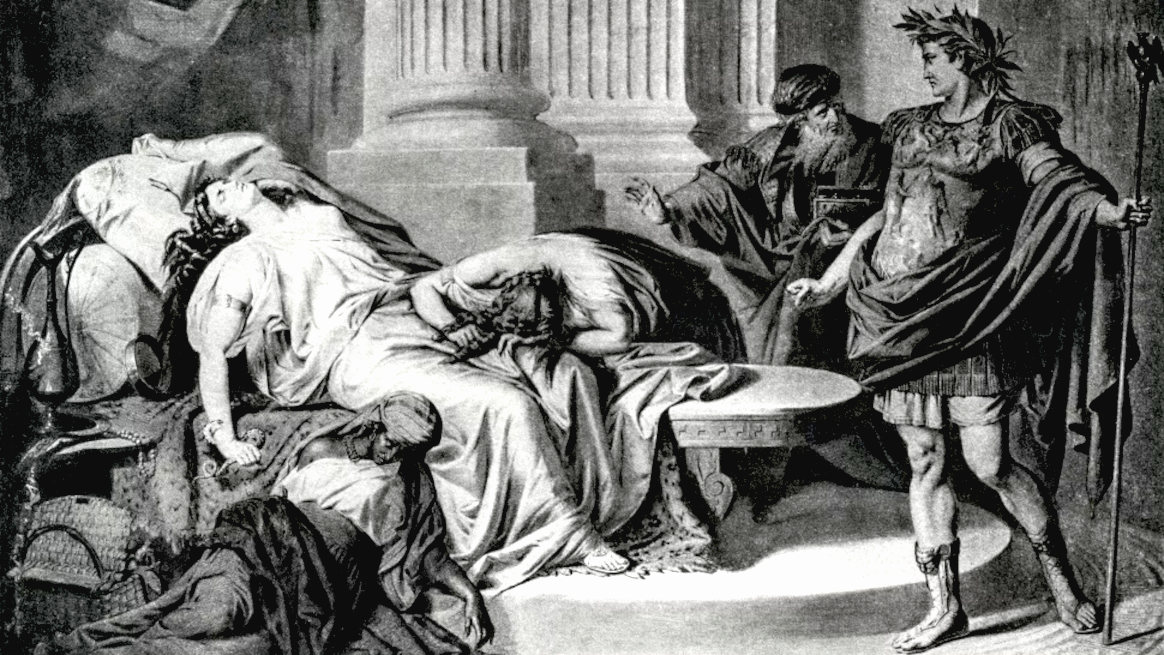
GROWING TENSIONS
Arriving in Rome on 6 May 44 BC, Octavian found consul Mark Antony, Caesar's former colleague, in an uneasy truce with the dictator's assassins. They had been granted a general amnesty on 17 March, yet Antony had succeeded in driving most of them out of Rome with an inflammatory eulogy at Caesar's funeral, mounting public opinion against the assassins.
Mark Antony was amassing political support, but Octavian still had opportunity to rival him as the leading member of the faction supporting Caesar. Mark Antony had lost the support of many Romans and supporters of Caesar when he initially opposed the motion to elevate Caesar to divine status. Octavian failed to persuade Antony to relinquish Caesar's money to him. During the summer, he managed to win support from Caesarian sympathizers and also made common with the Optimates, the former enemies of Caesar, who saw him as the lesser evil and hoped to manipulate him. In September, the leading Optimate orator Marcus Tullius Cicero began to attack Antony in a series of speeches portraying him as a threat to the Republican order.
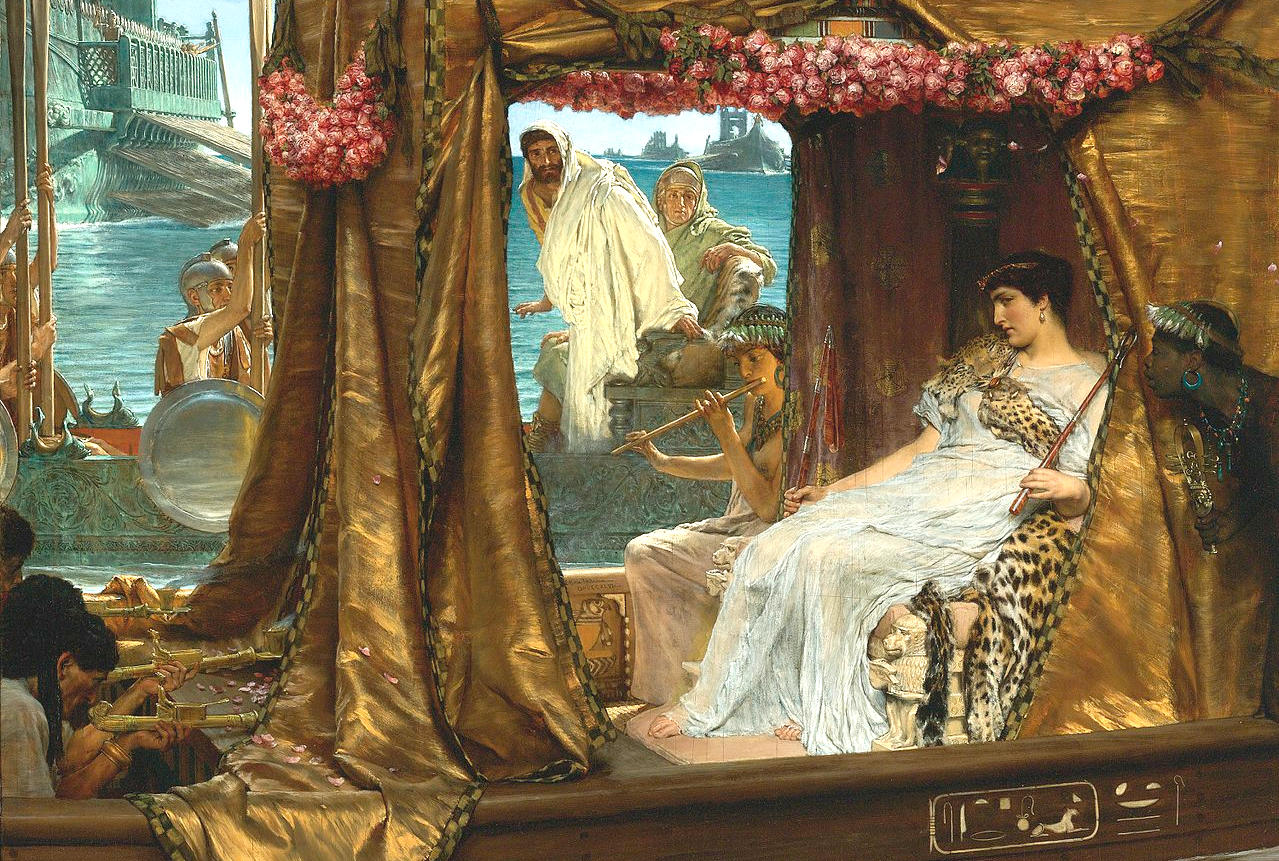
Cleopatra
meets Mark Antony, on her royal barge in Egypt
ANTONY & CLEOPATRA
Meanwhile, Antony's campaign turned disastrous against Parthia, tarnishing his image as a leader, and the mere 2,000 legionaries sent by Octavian to
Antony were hardly enough to replenish his forces. On the other hand, Cleopatra could restore his army to full strength; he already was engaged in a romantic affair with her, so he decided to send Octavia back to Rome. Octavian used this to spread propaganda implying that Antony was becoming less than Roman because he rejected a legitimate Roman spouse for an "Oriental paramour". In 36 BC, Octavian used a political ploy to make himself look less autocratic and Antony more the villain by proclaiming that the civil wars were coming to an end, and that he would step down as triumvir—if only Antony would do the same. Antony refused.
Roman troops captured the Kingdom of Armenia in 34 BC, and Antony made his son Alexander Helios the ruler of Armenia. He also awarded the title "Queen of Kings" to
Cleopatra, acts that Octavian used to convince the Roman Senate that Antony had ambitions to diminish the preeminence of Rome. Octavian became consul once again on 1 January 33 BC, and he opened the following session in the Senate with a vehement attack on Antony's grants of titles and territories to his relatives and to his queen.
The breach between Antony and Octavian prompted a large portion of the Senators, as well as both of that year's consuls, to leave Rome and defect to Antony. However, Octavian received two key deserters from Antony in the autumn of 32 BC: Munatius Plancus and Marcus Titius. These defectors gave Octavian the information that he needed to confirm with the Senate all the accusations that he made against Antony.
Octavian forcibly entered the temple of the Vestal Virgins and seized Antony's secret will, which he promptly publicized. The will would have given away Roman-conquered territories as kingdoms for his sons to rule, and designated Alexandria as the site for a tomb for him and his
queen. In late 32 BC, the Senate officially revoked Antony's powers as consul and declared war on Cleopatra's regime in Egypt.
In early 31 BC, Antony and Cleopatra were temporarily stationed in Greece when Octavian gained a preliminary victory: the navy successfully ferried troops across the Adriatic Sea under the command of Agrippa. Agrippa cut off Antony and Cleopatra's main force from their supply routes at sea, while Octavian landed on the mainland opposite the island of Corcyra (modern Corfu) and marched south. Trapped on land and sea, deserters of Antony's army fled to Octavian's side daily while Octavian's forces were comfortable enough to make preparations.
Antony's fleet sailed through the bay of Actium on the western coast of Greece in a desperate attempt to break free of the naval blockade. It was there that Antony's fleet faced the much larger fleet of smaller, more maneuverable ships under commanders Agrippa and Gaius Sosius in the Battle of Actium on 2 September 31 BC. Antony and his remaining forces were spared only due to a last-ditch effort by Cleopatra's fleet that had been waiting nearby.
Octavian pursued them and defeated their forces in Alexandria on 1 August 30
BC - after which Antony and Cleopatra committed suicide. Antony fell on his own sword and was taken by his soldiers back to Alexandria where he died in Cleopatra's arms. Cleopatra died soon after, reputedly by the venomous bite of an asp or by poison.
Octavian had exploited his position as Caesar's heir to further his own political career, and he was well aware of the dangers in allowing another person to do the same. He therefore followed the advice of Arius Didymus that "two Caesars are one too many", ordering Caesarion, Julius Caesar's son by Cleopatra, killed, while sparing Cleopatra's children by Antony, with the exception of Antony's older son. Octavian had previously shown little mercy to surrendered enemies and acted in ways that had proven unpopular with the Roman people, yet he was given credit for pardoning many of his opponents after the Battle of Actium.
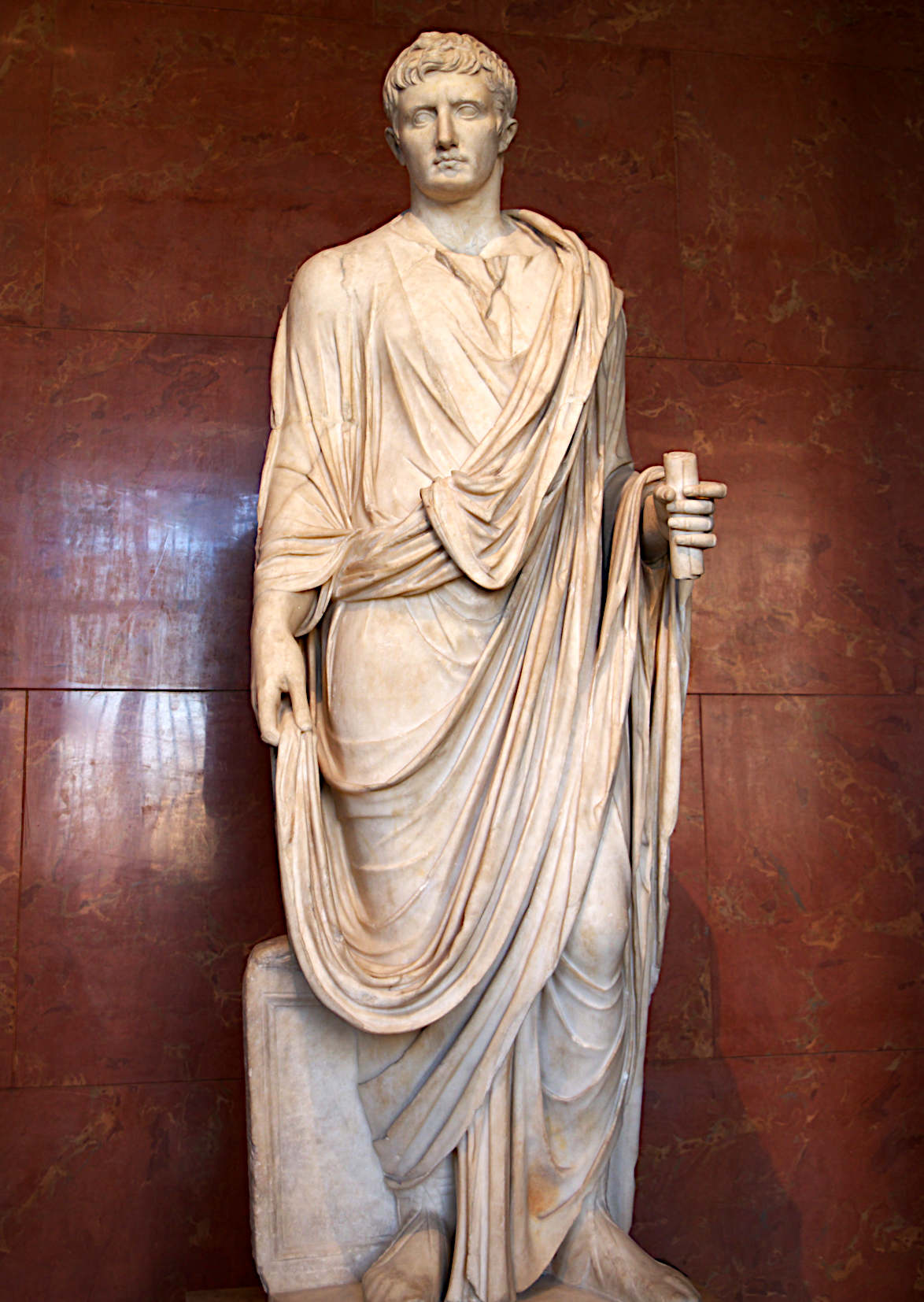
LEGACY
Augustus's reign laid the foundations of a regime that lasted, in one form or another, for nearly fifteen hundred years through the ultimate decline of the Western Roman Empire and until the Fall of Constantinople in 1453. Both his adoptive surname, Caesar, and his title Augustus became the permanent titles of the rulers of the Roman Empire for fourteen centuries after his death, in use both at Old Rome and at New Rome. In many languages, Caesar became the word for emperor, as in the German Kaiser and in the Bulgarian and subsequently Russian Tsar (sometimes Csar or Czar). The cult of Divus Augustus continued until the state religion of the Empire was changed to Christianity in 391 by Theodosius I. Consequently, there are many excellent statues and busts of the first emperor. He had composed an account of his achievements, the Res Gestae Divi Augusti, to be inscribed in bronze in front of his mausoleum. Copies of the text were inscribed throughout the Empire upon his death. The inscriptions in Latin featured translations in Greek beside it, and were inscribed on many public edifices, such as the temple in Ankara dubbed the Monumentum Ancyranum, called the "queen of inscriptions" by historian Theodor Mommsen.
The Res Gestae is the only work to have survived from antiquity, though Augustus is also known to have composed poems entitled Sicily, Epiphanus, and Ajax, an autobiography of 13 books, a philosophical treatise, and a written rebuttal to Brutus's Eulogy of Cato. Historians are able to analyze excerpts of letters penned by Augustus, preserved in other works, to others for additional facts or clues about his personal life.
Many consider Augustus to be Rome's greatest emperor; his policies certainly extended the Empire's life span and initiated the celebrated Pax Romana or Pax Augusta. The Roman Senate wished subsequent emperors to "be more fortunate than Augustus and better than Trajan". Augustus was intelligent, decisive, and a shrewd politician, but he was not perhaps as charismatic as Julius Caesar and was influenced on occasion by Livia (sometimes for the worse). Nevertheless, his legacy proved more enduring. The city of Rome was utterly transformed under Augustus, with Rome's first institutionalized police force, fire fighting force, and the establishment of the municipal prefect as a permanent office. The police force was divided into cohorts of 500 men each, while the units of firemen ranged from 500 to 1,000 men each, with 7 units assigned to 14 divided city sectors.
A praefectus vigilum, or "Prefect of the Watch" was put in charge of the vigiles, Rome's fire brigade and police. With Rome's civil wars at an end, Augustus was also able to create a standing army for the Roman Empire, fixed at a size of 28 legions of about 170,000 soldiers. This was supported by numerous auxiliary units of 500 non-citizen soldiers each, often recruited from recently conquered areas.
With his finances securing the maintenance of roads throughout Italy, Augustus also installed an official courier system of relay stations overseen by a military officer known as the praefectus vehiculorum. Besides the advent of swifter communication among Italian polities, his extensive building of roads throughout Italy also allowed Rome's armies to march swiftly and at an unprecedented pace across the country. In the year 6 Augustus established the aerarium militare, donating 170 million sesterces to the new military treasury that provided for both active and retired soldiers.
One of the most enduring institutions of Augustus was the establishment of the
Praetorian Guard in 27 BC, originally a personal bodyguard unit on the battlefield that evolved into an imperial guard as well as an important political force in Rome. They had the power to intimidate the Senate, install new emperors, and depose ones they disliked; the last emperor they served was Maxentius, as it was Constantine I who disbanded them in the early 4th century and destroyed their barracks, the Castra Praetoria.
Although the most powerful individual in the Roman Empire, Augustus wished to embody the spirit of Republican virtue and norms. He also wanted to relate to and connect with the concerns of the plebs and lay people. He achieved this through various means of generosity and a cutting back of lavish excess. In the year 29 BC, Augustus gave 400 sesterces (equal to 1/10 of a Roman pound of gold) each to 250,000 citizens, 1,000 sesterces each to 120,000 veterans in the colonies, and spent 700 million sesterces in purchasing land for his soldiers to settle upon. He also restored 82 different temples to display his care for the Roman pantheon of deities. In 28 BC, he melted down 80 silver statues erected in his likeness and in honor of him, an attempt of his to appear frugal and modest.
The longevity of Augustus's reign and its legacy to the Roman world should not be overlooked as a key factor in its success. As Tacitus wrote, the younger generations alive in AD 14 had never known any form of government other than the
Principate. Had Augustus died earlier (in 23 BC, for instance), matters might have turned out differently. The attrition of the civil wars on the old Republican oligarchy and the longevity of Augustus, therefore, must be seen as major contributing factors in the transformation of the Roman state into a de facto monarchy in these years. Augustus's own experience, his patience, his tact, and his political acumen also played their parts. He directed the future of the Empire down many lasting paths, from the existence of a standing professional army stationed at or near the frontiers, to the dynastic principle so often employed in the imperial succession, to the embellishment of the capital at the emperor's expense. Augustus's ultimate legacy was the peace and prosperity the Empire enjoyed for the next two centuries under the system he initiated. His memory was enshrined in the political ethos of the Imperial age as a paradigm of the good emperor. Every emperor of Rome adopted his name, Caesar Augustus, which gradually lost its character as a name and eventually became a title. The Augustan era poets Virgil and Horace praised Augustus as a defender of Rome, an upholder of moral justice, and an individual who bore the brunt of responsibility in maintaining the empire.
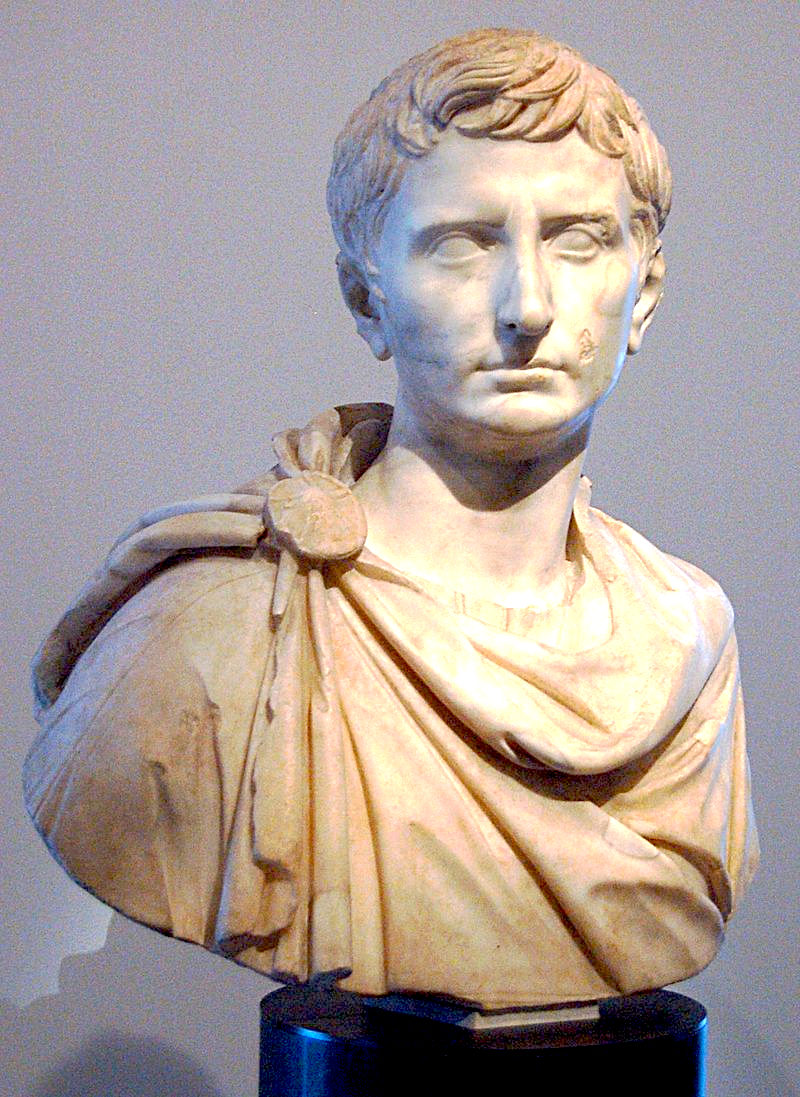
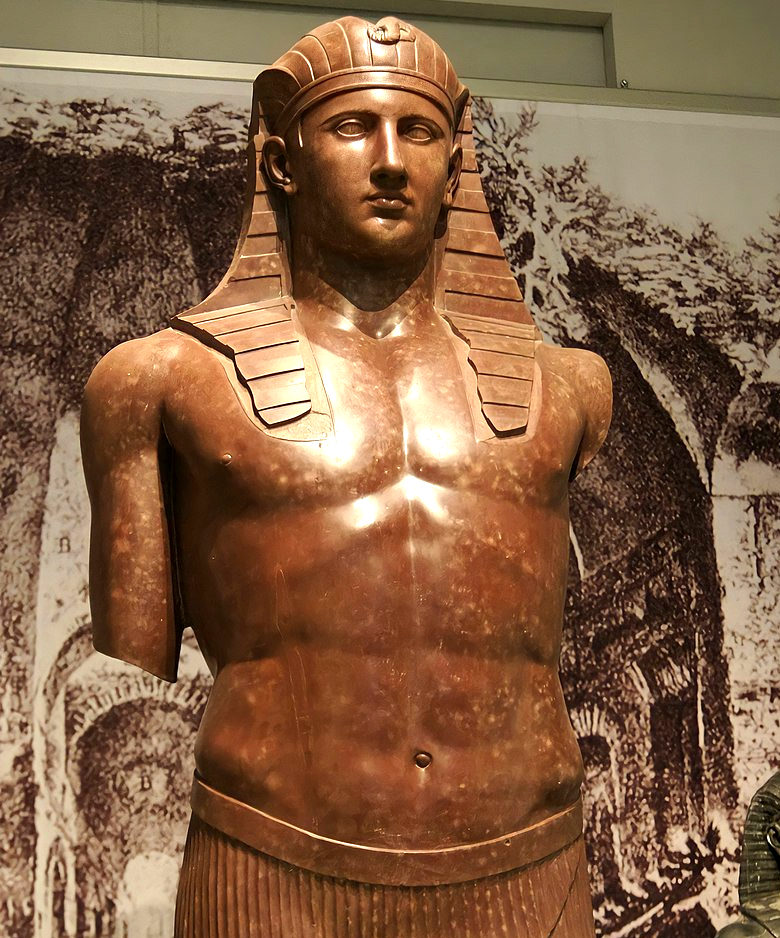
THE MONTH OF AUGUST
The month of August (Latin: Augustus) is named after Augustus; until his time it was called Sextilis (named so because it had been the sixth month of the original Roman calendar and the Latin word for six is sex). Commonly repeated lore has it that August has 31 days because Augustus wanted his month to match the length of
Julius
Caesar's July, but this is an invention of the 13th century scholar Johannes de Sacrobosco. Sextilis in fact had 31 days before it was renamed, and it was not chosen for its length (see Julian calendar).
According to a senatus consultum quoted by Macrobius, Sextilis was renamed to honor Augustus because several of the most significant events in his rise to power, culminating in the fall of Alexandria, fell in that month.
|







